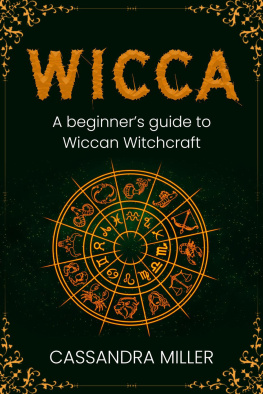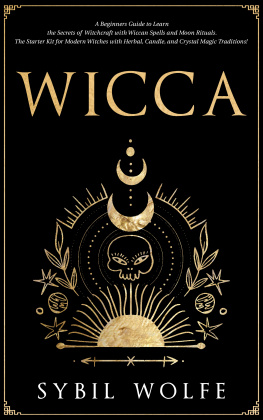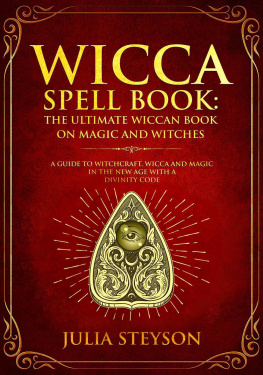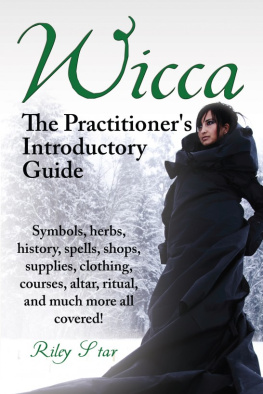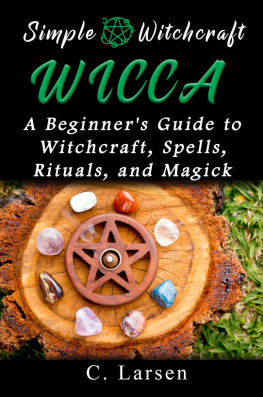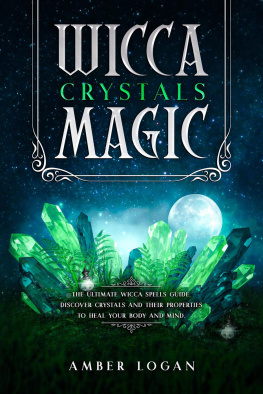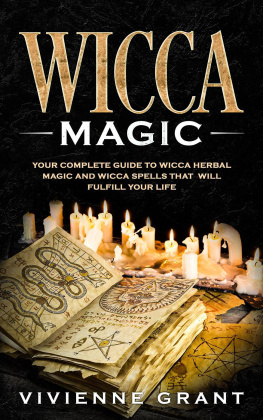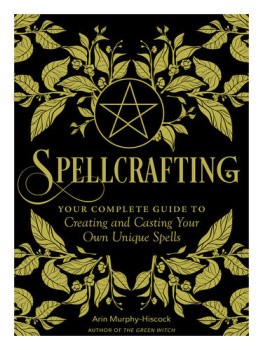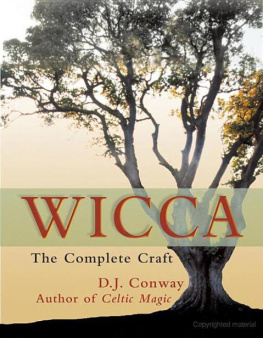Wicca
A Beginners Guide to Wiccan Witchcraft
Cassandra Miller
Table of Contents
T he religion of Wicca has been around far longer than many people realize and has changed with the times. It is not simply a group of dark-robed people standing around a cauldron concocting curses, but instead a serious faith with a rich history. It has touched every country in the world in some way, whether through historical influence or modern practitioners choosing to honor ancient deities. But despite this extensive history and influence, this faith is still heavily tied up in negative imagery that impacts the willingness people have to learn more about it.
When a person hears the word Wicca, their thoughts inevitably go to some predictable stereotypes. Very few people seem to be aware that Wicca and its practices predate many modern religions and even some ancient ones. This is a faith founded on respect for nature, respect for the self, and the idea of balance in all things. Many Wiccans blend different religious faiths or aspects of different cultures into their personal religious practice; in fact, much of Wicca is a flexible faith. There are only a few shared tenets among practitioners.
Wicca has no formally recognized churches or temples. Most practitioners work alone or in small groups commonly known as covens. Some attend non-denominational churches that are accepting of all faiths, such as the Unitarian Universalist church.
Wicca as a whole is surrounded by stereotypes and mystery. Its symbols are unique and can represent many different faiths and cultures, and its practitioners live all over the world. Some are open about their practice, and some are not, but all are devout to the deities or ideals they choose to uphold.
Many Wiccans are not open about their faith for fear of being judged based on misconceptions. Wiccans have been punished for their faith throughout history in many different countries; despite this, its not uncommon for Wiccan practices to become adopted into modern society. These practices have been so thoroughly claimed by people outside of the Wiccan faith that their origins have been almost entirely forgotten. One goal of this book is to educate readers and explain the truth about this ancient belief system that has captivated many in the modern era; the other is to introduce people to this different system of faith that is welcoming to all.
Wicca: No More Misconceptions
M ost Wiccans do not worship Satan. In fact, most Wiccans do not believe in any single entity who embodies all evil. Likewise, they do not believe in Hell or any similar place of eternal torment or judgement. Satan and Hell belong solely to the Christian faith and have no role in Wicca. Some Wiccans choose to worship deities from other cultures, such as cultures shared by their family or homeland. Some choose to pray to their ancestors, relying on the wisdom of those who came before. Others might pray to a nameless god or goddess. Still others prefer to simply honor and respect nature without referencing a specific deity or considering any greater power than their own will.
Many Wiccans believe in an afterlife in the form of Summerland. This is believed to be a place where nature is continually blooming and growing; everything is fertile and green, and all weariness and illness is gone. Family members are reunited in this beautiful land. This afterlife is a paradise for nature-worshipping Wiccans.
The spellwork performed in Wicca is specified as magick as opposed to magic. This is a simple spelling commonality that is intended to separate Wiccan spells and prayers from card tricks or sleight of hand. The two should not be conflated; where one is a series of deeply rooted cultural practices, the other is merely entertainment. Wicca is a religion that involves neither tricks nor luck nor much of the supernatural (though some do consider the supernatural an important part of their practice, as we will continue to discuss).
Some Wiccans may choose to use Ouija boards or other methods to communicate with the dead, but this rarely looks like a shadowy seance ending with the lights flickering on and off and someone getting possessed. Those who choose to deal with such forces do so with caution and respect. They would no sooner order the dead around than they would tell a god or goddess what to do. Rather, Wiccans who choose to make contact with spirits or ghosts will usually do so to try and learn from them. They might want to learn more about themselves, the spirits in question, or why they linger. This practice is very individualized from one Wiccan to another; some behave as ghost hunters, seeking them out to learn about their lives and to send them peacefully away. Others just pray to their ancestors for guidance.
Modern Wiccans do not perform animal sacrifices or deliberately hurt other people. Killing animals isnt a common practice for anyone who reveres nature; while it may have been more commonplace in the past, it is now considered taboo. That being said, do not stereotype all Wiccans as goofy, tree-hugging pacifists; vegetarianism, veganism, and pacifism are not required of Wiccans. While most Wiccans avoid harming others through their own actions, they know that conflict is unavoidable in life and that there are times it cannot be prevented. They usually try to send out positive energy and hope for the best outcome in any situation. A common saying in Wicca is that the more magick you know, the less you use it. This is because Wiccans tend to use spells as a last resort. They will always try to find mundane solutions to their problems first.
Lets address another common stereotype. Sex magick exists in Wicca, but it is only practiced between consenting adults and is never a public act in any way. Practicing in the nude (called going skyclad) is likewise only done in private and with advanced warning to other coven members. Not every Wiccan is part of a coven, and they do not have to be. Likewise, Wicca is open for anyone who wishes to learn. There is no formalized learning a person must have to call themselves a Wiccan and no requirement to have a Wiccan in your family in order to practice. This is not a faith tied to heredity or specific honors or labels; anyone with the desire to learn is free to do their own research and join this diverse and eclectic system of faith in whatever way they choose.
The only difference here involves covens, in which rules about formalized learning can change. Some covens have approved training that they pass on to initiates in order to keep a base level of shared knowledge within the group. The knowledge held by covens can sometimes come in levels depending on a person's amount of involvement within the group. A common knowledge base usually consists of the deities the coven prays to, their personal traditions and established guardians, and other basics. In addition to providing newcomers with mentors and teachers, covens provide a central system of support and community revolving around a common set of practices (for example, where every coven member prays to the same deity).
Origins Of Wicca
M any Wiccan practices were born out of parts of many different religious faiths. Throughout history, cultures have conquered and colonized each other, claiming land and people as they went. When it came to attempts to teach or spread their faith, the conquering nation was sometimes careful to spread its own religion in a manner that would not entirely alienate the natives in the hopes of getting it to stick. To encourage this, they would sometimes tweak native religious practices to fit their own faiths. An example of this is the Christmas tree, which started as an ancient pagan practice; pagans would bring green branches into their homes in the winter as a way to remind themselves that the cold would not last forever, and spring would still return. Christians blended that tradition with their own Christmas celebrations in an attempt to bring pagans over to their faith, and the Christmas tree eventually became so popular that its origins were forgotten.
Next page
